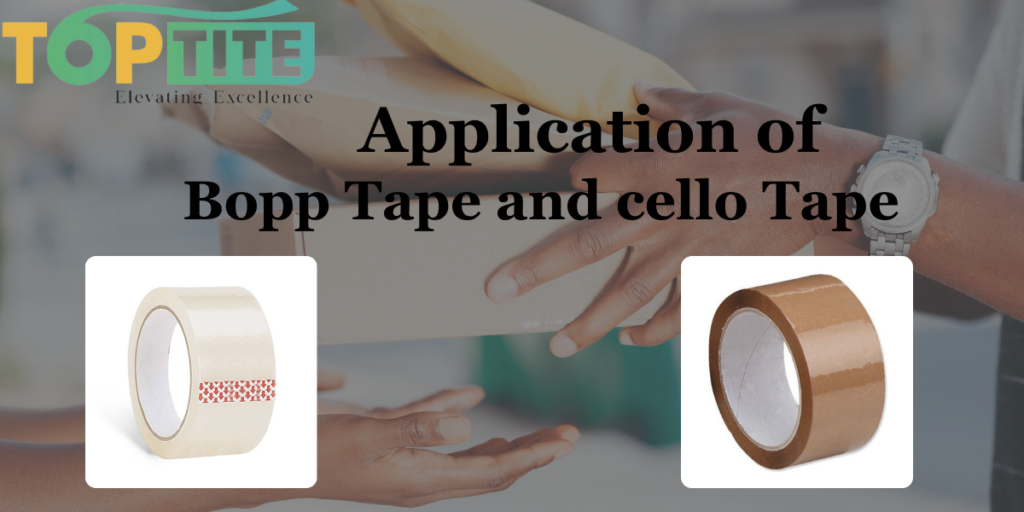Introduction
In this blog we give you the complete information about difference between BOPP Tape and Cello Tape. In the realm of adhesive tapes, two commonly used products stand out for their versatility and effectiveness: BOPP tape and cello tape. While both serve the purpose of sealing and packaging, they possess distinct characteristics that make them suitable for various applications. In this comprehensive comparison, we delve into the differences between BOPP tape and cello tape, exploring their composition, properties, applications, and advantages.
Know Mager Difference Between BOPP Tape and Cello Tape
Table of Content
Composition and Manufacturing :
BOPP Tape:
BOPP tape, short for Biaxially Oriented Polypropylene tape, is crafted from a polypropylene film that undergoes a biaxial stretching process to enhance its strength and durability. The composition typically includes three layers: the backing material, adhesive layer, and release liner. The backing material consists of the biaxially oriented polypropylene film, providing the tape with dimensional stability and tear resistance. An acrylic adhesive layer ensures strong adhesion to various surfaces, while a release liner protects the adhesive until the tape is ready for use.
Cello Tape:
Cello tape, on the other hand, is commonly known as transparent adhesive tape or Scotch tape. It is crafted from a thin, transparent film of cellulose acetate or cellulose nitrate, hence the name “cello.” The adhesive used in cello tape is typically a pressure-sensitive adhesive (PSA), which allows for easy application and removal. Unlike BOPP tape, cello tape usually does not feature a release liner and consists of a single layer of backing material with adhesive applied directly onto it.
Properties and Characteristics:
BOPP Tape:
BOPP tape is renowned for its exceptional strength, tear resistance, and dimensional stability. The biaxial stretching process aligns the molecules of the polypropylene film, imparting superior mechanical properties to the tape. As a result, BOPP tape exhibits excellent tensile strength, making it ideal for sealing heavy-duty packages and cartons. Additionally, its resistance to moisture, chemicals, and temperature variations ensures reliable performance in various environments.
Cello Tape:
Cello tape, while versatile, tends to be thinner and less durable compared to BOPP tape. The cellulose-based backing material offers moderate tensile strength and flexibility, making it suitable for lightweight packaging and general-purpose applications. Cello tape is prized for its transparency, allowing for discreet sealing and invisible repairs. However, its adhesive may not adhere as strongly to certain surfaces or withstand harsh environmental conditions as effectively as BOPP tape
Major Difference Between BOPP Tape and Cello Tape in Applications:
BOPP Tape:
BOPP tape finds widespread applications across numerous industries, including packaging, logistics, construction, automotive, and healthcare. Its superior strength, durability, and resistance to moisture and chemicals make it particularly well-suited for sealing cartons, bundling materials, and securing packages during transit. BOPP tape is also used for labeling, masking, and surface protection in vari
Cello Tape:
Cello tape is commonly used for light-duty packaging, gift wrapping, crafting, and office tasks. Its transparency and ease of use make it popular for sealing envelopes, attaching documents, and mounting posters. Cello tape is also employed for temporary repairs, such as mending torn paper or securing loose items. However, its limited strength and durability may make it less suitable for heavy-duty or industrial applications compared to BOPP tape.

Advantages and Disadvantages :
BOPP Tape:
Advantages:
Superior strength and tear resistanceExcellent adhesion to a wide range of surfaces Resistance to moisture, chemicals, and temperature variations Suitable for heavy-duty packaging and industrial applications
Disadvantages:
Generally more expensive than cello tape May be overkill for light-duty or temporary tasks
Cello Tape:
Advantages:
Transparent and discreet Easy to use and remove Ideal for light-duty packaging and general-purpose tasks Cost-effective option for everyday use
Disadvantages :
Limited strength and durability Adhesive may not adhere well to all surfaces Not suitable for heavy-duty or industrial applications
Conclusion:
In this blog, we discuss the magur difference between BOPP Tape and Cello Tape. In conclusion, while both BOPP tape and cello tape serve the purpose of sealing and packaging, they differ significantly in composition, properties, applications, and advantages. BOPP tape stands out for its superior strength, durability, and resistance to harsh environmental conditions, making it the preferred choice for heavy-duty packaging and industrial use. In contrast, cello tape offers transparency, ease of use, and affordability, making it ideal for light-duty tasks and everyday applications. By understanding the distinctions between these two adhesive tapes, users can make informed decisions based on their specific needs and requirements.




